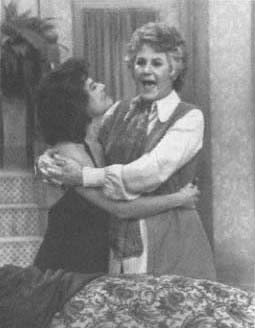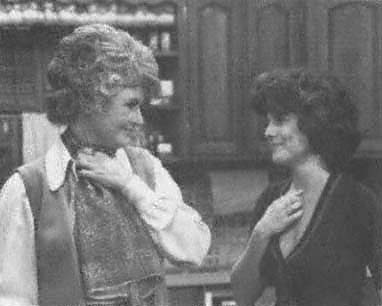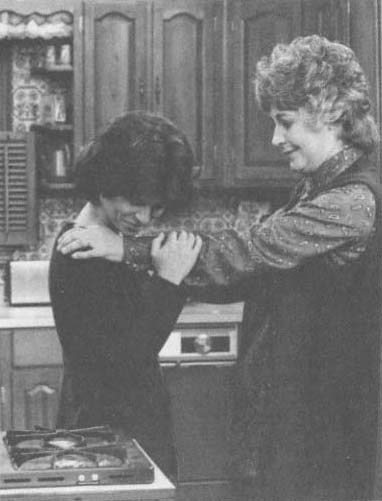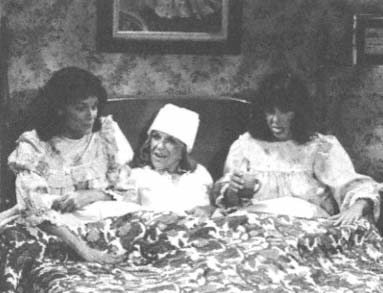Sitcom Subversions: Working Daughters and Radical Mothers
One year after Spock bid farewell to his well-meaning paternalism, the wittiest matriarch ever to hit prime time emerged on CBS. The sitcom "Maude," a turning point for the representation of mothers and daughters on television, has not received the attention or the accolades it deserves.[32] It certainly has not achieved the near cult status of such classic seventies "quality" sitcoms as "All in the Family" (from which "Maude" was a spin-off), "The Mary Tyler Moore Show," and "M*A*S*H." This is not surprising, given the character Maude herself. If Mary Richards used traditional feminine qualities to rethink office politics and women and work questions and Edith Bunker was the stereotypical silly woman with a heart of gold, then Maude was the loud, brazen, brassy Bella Abzug of prime time. She was funny without being self-abnegating, smart without being coy, and contentious without being apologetic. She was, in other words, a radical woman.
"Maude" was also the first prime-time TV sitcom to portray an adult mother and daughter living together. In that, and in so many other ways, this was really a "social issue" sitcom with a sincerity and depth that surpassed that classic of social sitcoms, "All in the Family." There were no fools in "Maude," no buffoons, no sitting targets waiting to be dissected with a dose of Learian liberalism. Even the right-wing character, Arthur, though often buffoonish, was more often than not a relatively articulate spokesman for the small-minded Nixonian conservatism that Maude was always battling. The subject of Maude was not the single girl in the big city, working-class bigotry, or the hellishness of war, but rather the liberal, enlightened family itself. Maude represents the grand reversal of the "domesticoms" of the fifties, in that it locates itself in terms of genre within that trusted environment of the family home and then explores the new configurations and struggles engendered in that space since the late 1960s.
One of the significant dislocations of the traditional nuclear family has most certainly been the growing rates of divorce and single parenthood, two issues that provide narrative grist for the mill of the social sitcom.[33] Maude was obviously no exception here: she had been married four times before she settled on her current mate, the wry appliance salesman Walter Findlay; and her daugh-
ter was a divorced, twenty-seven-year-old mother of an eight-year-old son when she came to live with Maude and Walter.
The relationship between Maude and her daughter Carol is unlike any I have seen on TV shows. Unlike "Rhoda," which framed the mother/daughter relationship within the more traditional structure of old-fashioned, interfering Jewish mother and daughter struggling to be liberated, "Maude" shows both mother and daughter as feminists and "liberated women." This sets "Maude" apart and in some ways makes it more advanced than the times would suggest. Although Carol often plays the part of spokeswoman for the "new woman," she is by no means alone in this; it is this dialogue between mother and daughter that is so refreshing and enlightening. In one of the best (and most controversial) episodes, Maude has gotten pregnant at age forty-seven and faces the dilemma of whether to have this baby, which she clearly doesn't want, or to have an abortion (legal by this time in the state of New York). Carol urges her mother on: "There is no earthly reason for you to go through this at your age," and she is amazed at Maude's hesitancy, given her politics:
Carol: "Mother, I don't understand your hesitancy. When they made it a law you were for it."
Maude: "Of course, I wasn't pregnant then."
Carol: "Mother, it's ridiculous, my saying this to you . We're free. We finally have the right to decide what we can do with our own bodies."
Maude does go on to have the abortion, with the support of her daughter and her husband.
Although struggle and conflict are openly and humorously acknowledged, they never entail a sense of the need for rift and permanent separation: these two women obviously love each other and, in many ways, are much alike. Several episodes point this out clearly. In "Like Mother, Like Daughter" (1972), Carol has begun dating a man many years her senior, and, importantly, a man Maude used to see before she met Walter. Maude is concerned that Carol will be jilted as she was and, after waiting up for Carol all night, confides her distress to Walter over breakfast:
Maude: "Walter, I am going to put a stop to this right now!"
Walter: "Now look Maude, if you break this up Carol's going to think you're an interfering mother. You want that?"



Figs. 19, 20, 21.
Bea Arthur is the liberal doyenne of East Coast suburbia and Adrienne Barbeau is her
equally feisty/feminist daughter in the complex, challenging, and always funny "Maude."
(CBS, photos courtesy of Columbia Pictures and CBS Stills Archive)
Maude: "It's a hazard of the trade Walter. I didn't interfere when she eloped with Pete and it ended in divorce. I've never forgiven myself."
Walter: "Then why didn't you interfere?"
Maude: "I was in Reno at the time divorcing Albert."
First, as in many such scenes, the explicit and humorous discourse of "the interfering mother" helps make it less deadly, less pres criptive and pathologizing. In addition, Maude's statement about her own divorce not only links the experience of mother and daughter but gives the mother a life, so her interference is put in perspective.
In the next scene, Carol has come down the stairs and into the kitchen, clearly not eager to talk. Yet Maude persists, putting her hand on Carol's shoulders and facing her, a stance that is repeated time and time again between mother and daughter throughout the series: "I know you're going to tell me again to mind my own business. But look at it this way: God couldn't be everywhere, that's why he invented mothers." But Carol is having none of it, telling Maude she doesn't intend to see him again anyway because he called her "Maude" last night. Maude assumes it was during lovemaking and is flattered, but it turns out it was during an argument in which Russell (the lover) accused Carol of sounding just like her mother. When Russell emerges to make amends, he is placed physically between the two women, who proceed to demolish him (as an egocentric jerk) and send him out the door. As Maude returns from the doorway, she walks over to Carol: "Good morning honey," "Good morning mother," and they smile, hug, and kiss.
However, the scene doesn't end on that note. Maude continues to tell Carol of her experience with Russell, and Carol comforts her. When Walter walks in to apologize for his jealousy, Carol and Maude are seated on the edge of the couch, one slightly behind the other in a "matching" shot (similar clothes, hairstyles, position on couch, etc.) that is accentuated by the identical warm smile they give Walter during his speech. The women are brought together by a sense of wry sisterhood refracted through the egocentric man they both slept with and by a sense of mutual nurturing and caretaking.
In a 1976 episode entitled "The Election," both Maude and her daughter are working for the Carter campaign. This shared work, although typically providing material for discourses of "enmeshment" and "lack of separation," here is expressed in terms of mutual pride and, always, humor:
Maude: "Oh you know Carol, I just think you're wonderful. The way you have thrown yourself into this presidential campaign."
Carol: "Well, after all, I am your daughter. You know what they say: the acorn doesn't fall far from the political nut."
Maude: "Carol, you know you're getting to be more like me all the time. And some day we're both going to pay for it."
It sounds banal, but the simple statement from a mother to a daughter, "I think you're wonderful," and its response, "I am your daughter," moves us decades away from the agonizing ideologies of separation and struggle. To acknowledge love, closeness, and sameness without being stamped as "overinvolved," "enmeshed," and "immature" is a major step in a feminist direction for the image of the mother/daughter relationship.
Another 1972 episode also depathologizes the stereotype of the interfering mother. Carol has just announced, after being unemployed and suffering sexual harassment while looking for work, that she intends to get married. Maude is understandably upset because Carol has discussed none of this with her.
Walter: "Maude, I don't want Carol to make a mistake any more than you do. But I got a pretty good feeling that you're beginning to lead her life again."
Maude: "Will you do me a favor with your feelings Walter? Save them, and then someday give them all to me together in a lump. In my old age maybe I'll browse through them and find out who you were."
If this event had occurred, say, in "Father Knows Best," the father would have gently showed the mother the error of her meddling ways and led the family into complete harmony. But here, in the 1970s, Maude's humor undercuts Walter's attempt at paternalism (the man who knows best about how to handle both mother and daughter) and implies that, in this universe, mother knows best. Walter continues to play the role of mediator, but it is a role without the ideological power it had previously. When he calmly tells Maude that "Carol's a grown woman. You're her mother but you can't talk to her like her mother," Maude swiftly dispatches him with a biting remark and proceeds to deal with her daughter in her own way, which clearly does not include enacting this cloying psychological dictum of "loving and letting go," as she illustrates when she comes up to Carol's room:
Maude: "Honey do you mind if I come in? If I promise. . . ."
Carol: "Promise what?"
Maude: "If I promise not to talk like a mother?"
Carol: "All right."
Maude (strides over to Carol): "If I promise not to talk about the way you're wrecking your life."
When Carol reproaches her, Maude asks, "Would it disturb you terribly if I cried? Very quietly?" Then she gives a delightful speech, pleading for her daughter's attention: "Carol! I've been your mother for 27 years. I carried you for nine months before then. I lived with your father for 2 years longer than I wanted to because I thought you needed him . . . so don't try to keep me to some promise I made a few minutes ago when I was half out of my mind with grief." Here Maude undercuts the traditional maternal martyr theme by introducing her own humorous note regarding Carol's father and the overstatement of the grief. The issues in their discussion of Carol's impending marriage are important: Maude doesn't want her daughter to "settle"—to marry for anything less than love, even though they both acknowledge the hardships of single parenthood. Ironically, the reversal here is complete: in contrast to images of earlier years, the mother is arguing for love and integrity while the daughter is arguing for compliance and compromise. But in the mother's victory (Carol doesn't marry) is a victory for all women, both mother and daughter.
"Maude" remains unique in that it acknowledges the scripts already written for mothers and daughters (as Maude says to Carol, "Children resent and mothers interfere. That comes with the territory.") while implicitly challenging their authenticity. The traditional scripts, with their emphasis on separation and the inevitability of discord, certainly have no narrative space for an adult mother and her adult daughter living and thriving together. "Maude" takes on June and Margaret and Donna and, in doing so, challenges not only the mythology of the perfect mother (who knows that father really does know best), but the mythology of the demon mother, too. Maude insists on being involved in her daughter's life, and her daughter insists on being involved in Maude's life.
Although Rhoda and her mother do not live together, as Maude and Carol do, Ida Morgenstern is nevertheless a persistent pres-
ence in "Rhoda." In many ways, "Rhoda" is a much more conservative and traditional series than "Maude." I would have expected otherwise because one show depicts the classic feminist subject of the seventies (single working girl on her own in the big city), and the other is located firmly in the heartland of domestic sitcoms: the suburban family home. Yet the centrality in "Rhoda" of the "search" for a male partner (indeed, just look how quickly a husband is found for her, placing her sister Brenda in the role of perpetually dateless man seeker) effectively devalues and limits the exploration of either the mother/daughter or the sister/sister relationship in a meaningful way. Even numerically speaking, "Rhoda" has very few episodes devoted to exploring this relationship in a narratively significant way, especially when compared to "Maude." In addition, the choice to make Ida so stereotypically "the Jewish mother" often took the possible depth and poignancy out of the interactions between the two women.
In the early episodes, Rhoda and her mother are largely sparring partners (indeed, the battle metaphors abound when Rhoda and Brenda describe their mother) competing in a lightweight battle of goodhearted and warm generational boxing. In later episodes, there are signs that the relationship is being depicted for something more than knowing and guaranteed chuckles. Perhaps it was in response to the declining ratings after the incredibly boring marriage to the uninteresting character of Joe, but for whatever reasons, several 1976 and 1977 episodes begin to get beyond the obvious.
Generally, the interactions between Rhoda and her mother center on the mother arriving unexpectedly at Rhoda and Brenda's apartment building and making a variety of critical remarks about their apartment, their clothes, the men in their lives, their weight, and so forth. There is usually a bit of playful banter, and everyone ends up laughing and cheery at the end. The mother/daughter relationship is typically defined within the narrow terms of loud, interfering, guilt-making but well-meaning mother and loving and tolerant but often exasperated daughters. While "Maude" overturns Donna and Margaret, "Rhoda" departs from the familial setting but, in many ways, recaptures the spirit of working girl in the big city series such as "Our Miss Brooks" and "That Girl."
Yet "Rhoda" occasionally slipped outside this generic straitjacket, allowing for a richer interaction between mother and

Fig. 22.
One of several spinoffs from the highly innovative "Mary Tyler Moore Show,"
"Rhoda" was a peculiar cross between "That Girl" and "The Goldbergs."
(CBS; photo courtesy of Photofest)
daughter than the usual faintly humorous generational and ethnic repartee. In the episode where Rhoda is getting separated from Joe, Ida is allowed to emerge as more than a caricature. Rhoda, afraid of her mother's disappointment, does not immediately tell her, but Ida finds out anyway from Joe. She immediately goes over to Rhoda's to try and help, and Rhoda resists, insisting that she's fine:
Rhoda: "I'm telling you that I'm fine. Can't you see that I'm fine?"
Ida (tremulously, with an atypically small and quiet voice): "Rhoda . . . I love you . . . don't lock me out."
Rhoda (long pause): "I'm terrified. I have never been so scared in my entire life."
Ida (moving over to her, she takes her in her arms and holds her while talking): "No, no sweetheart, no, don't be scared. I'm here, I'm here." (Rhoda is now sitting on the edge of the couch so that they are the same height.)
Rhoda: "Don't you be scared either, OK?"
Ida: "Yeah, right, listen. There has to be something that I can do for you. You know in my day my mother would have said do anything to save the marriage, make any kind of adjustments, put up with anything. I, I guess that doesn't go now anymore, does it?"
Rhoda: "No Ma, no, it doesn't."
Ida then goes to call her husband to say she's staying with Rhoda for a few days, and Rhoda protests loudly:
Ida: "That's no good huh? (She looks at Rhoda, who gently shakes her head.) Right. (She puts down the phone.) That would have been good for me but, uh, that's no good for you, huh? OK, well, uh, I guess the best thing I can do then is to uh leave you alone."
Rhoda: "That's right ma."
Ida gets ready to leave, they kiss goodnight, and, as she is halfway out the door, Rhoda calls to her, "Ma?" Ida turns back, "Yeah?" Rhoda says, "Stick around?" Ida comes back in to her ("Oh yeah"), they embrace, and the image fades out.
This scene is interesting on a number of levels. First, it is definitely atypical of the series as a whole, which generally tended toward the more secure sitcom laughs via the caricatured mother. Nevertheless, this scene references both Ida's needs (e.g., to reframe "interfering" in terms of love and caring) and the new feminist era ("You know in my day. . . ."). This signifies a theme common to many of the "new woman" series in 1970s TV: the daughter's life as fundamentally different from the mother's. The interaction between mother and daughter is thus framed through this one historical disjuncture.
In "One Day at a Time," we get this two ways—divorced single parent Ann's life is different from her mother's, but her own girls extend this trajectory of liberation. Much of the narrative of this series centers on the trials and tribulations of raising two adolescent daughters, and the series was quick to feature the context of single parenthood. In a 1976 episode entitled "Ann's First Decision," the reality of Ann's status as single mother becomes the subject of the episode. Daughter Julie has assumed that her "liberated mother" would allow her to go on a camping trip with a group of girls and boys. When mom refuses, hysterical teenage Julie runs off to be
with her father, and mom feels like she made a mistake: "it's really something. For the first seventeen years of my life, my father made the decisions. And the next seventeen, my husband made the decisions. The first time in my life I make a decision on my own and I blow it." This statement surely had enormous resonance for a whole generation of women undergoing divorces, sustaining the inevitable drop in income, and suddenly being faced with responsibilities and positions that had formerly been closed to them. Yet the resolution of this mother's dilemma comes from a sadly obvious source: her boyfriend. Boyfriend and divorce lawyer David gently points out to her the error of her ways, and only then is she able to sit down with her girls and give a speech that sounds more like a team pep rally than a family dialogue ("Stick with me, huh? We'll make it . . .").
Although generally an uninspired show, "One Day at a Time" was innovative simply for what it was: a single-parent family with an unrepentant working mother. By existing at all, it must have given validation to the thousands of women and children going through that experience and fighting against the ideologies of "broken homes" and "latchkey children."[34] Daughters Barbara and Julie were shown engaged in the responsibilities familiar to children of single parents (cooking, cleaning, watching out for each other) and were not summarily identified as "overly responsible" or "parentified" children. Indeed, "One Day at a Time" went out of its way to portray them as "normal" American teenagers, not in any way "afflicted" by the stigma of living in a single-parent family.
A made-for-TV movie, "Like Mom, Like Me" (1978), also deals positively with single-parent families. As in "one Day at a Time," mother's feminist coming of age is paralleled with that of her adolescent daughter. As mother searches to "discover herself" and explore her sexual independence, her young daughter simultaneously works out her own developing sexuality in a social terrain new to both women. Linda Lavin plays a woman who has come to a new city to take a job as an English professor at the local college after her husband has run off with one of his students. The intimacy and mutual support between mother and daughter is apparent, as is the importance of the absent (and much loved by daughter) father. Although mom initially gets "punished" for her independent sexuality when she spends a late evening with a visiting professor (leaving
her worried daughter to eat her dinner alone and subsequently call the police), she nevertheless refuses to reunite with her husband: "I don't ever want to be so dependent upon anybody, that I feel that my life is lost without him. . . . I do have someone else finally. . . . I have me." Daughter is joined with mother in this early feminist quest for independence by a remarkable speech extolling the virtues of single parenthood and the mutuality of mother/daughter nurturing. Although problematic in its identification of female independence with sexuality (we see very little of mom's new teaching career), this TV movie nevertheless refuses the bond/separate motif, instead opting for an inscription of both mother and daughter within the new discourses of female self-identity and familial change. In so doing, the film ends not with a rupture between mother and daughter, but with a continuation of a genuine and reciprocal bond of care and concern.
The difference with a series like "Maude" is that feminism and the women's movement are active signifiers in the overall narrative, whereas neither "Rhoda" nor "One Day at a Time" gives us a sense of these women's involvement in the women's movement or that they have been influenced by it in any significant way. Indeed, Rhoda seems to have left much of her sisterhood behind when she left Minneapolis and moved back to New York, and Ann Romano seems rather like a hipper version of the "perfect moms" of the 1950s like Donna and June. As Ella Taylor notes, feminism was active in defining the new features of Ann's life, but so too was the newly resurgent language of psychology: "Ann learns to be an adult, a new woman, and a new kind of parent. If feminism helps her to redefine the terms of her life, so too does a highly contemporary psychological sensibility, which comes to usurp the language of ethics as a basis for action."[35]
Although Carol's life is different from mother Maude's, it is a difference that they share rather than a difference one owns at the other's expense (either humorous expense or otherwise). In one episode, when Maude first starts seeing Walter, they contemplate living together. Importantly, Walter voices the traditional love and marriage ideology. Maude and her daughter are represented equally as women warriors in the same suburban battlefield, turning over the last remnants of charred domesticity in their march toward a feminist future.